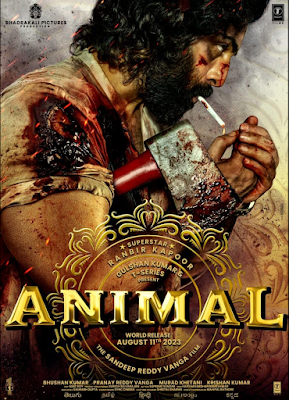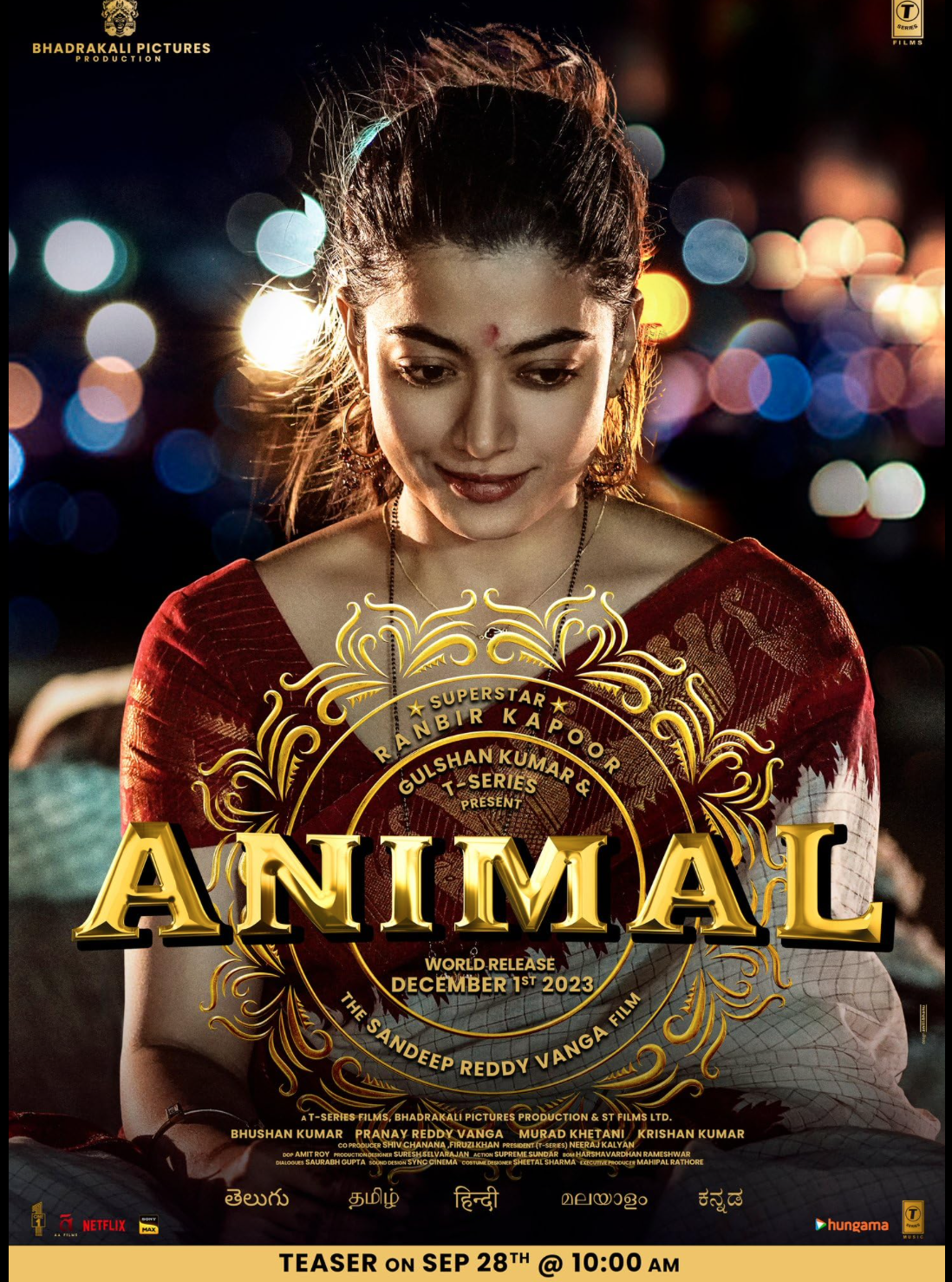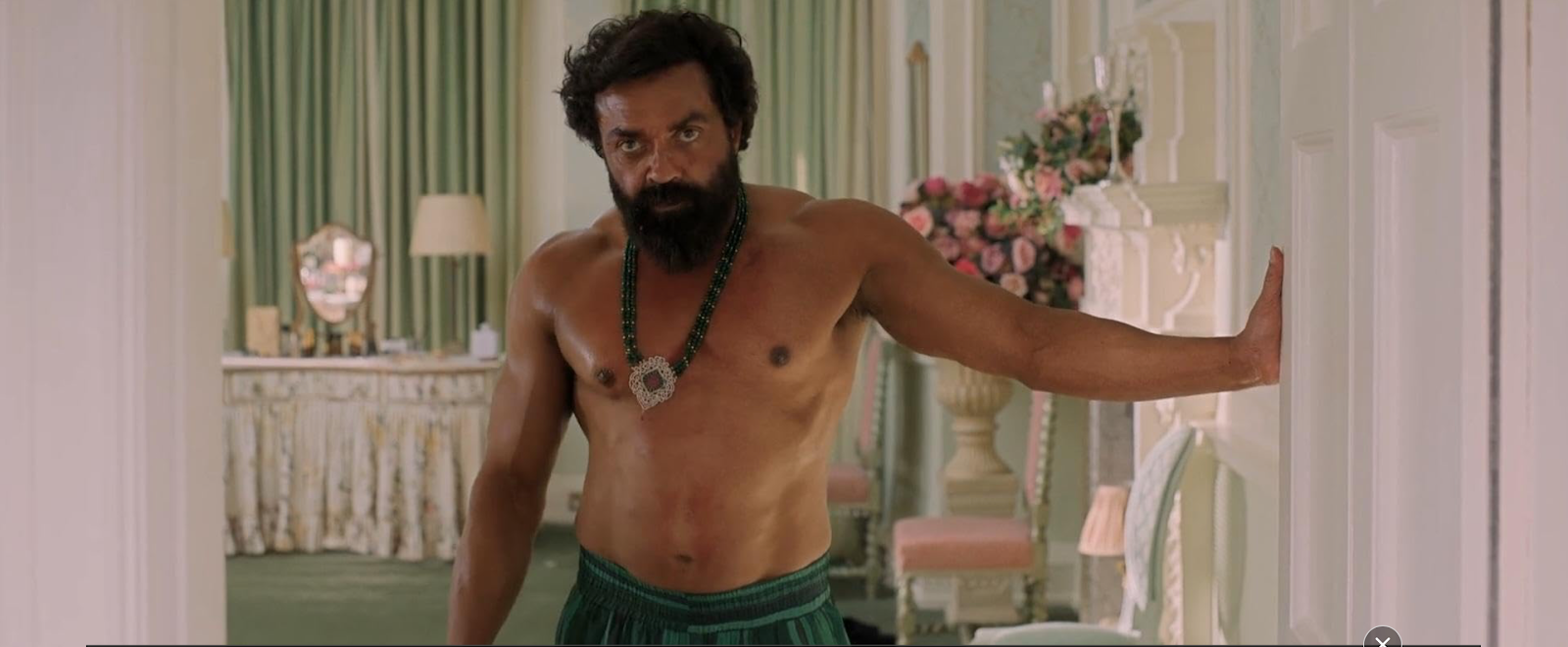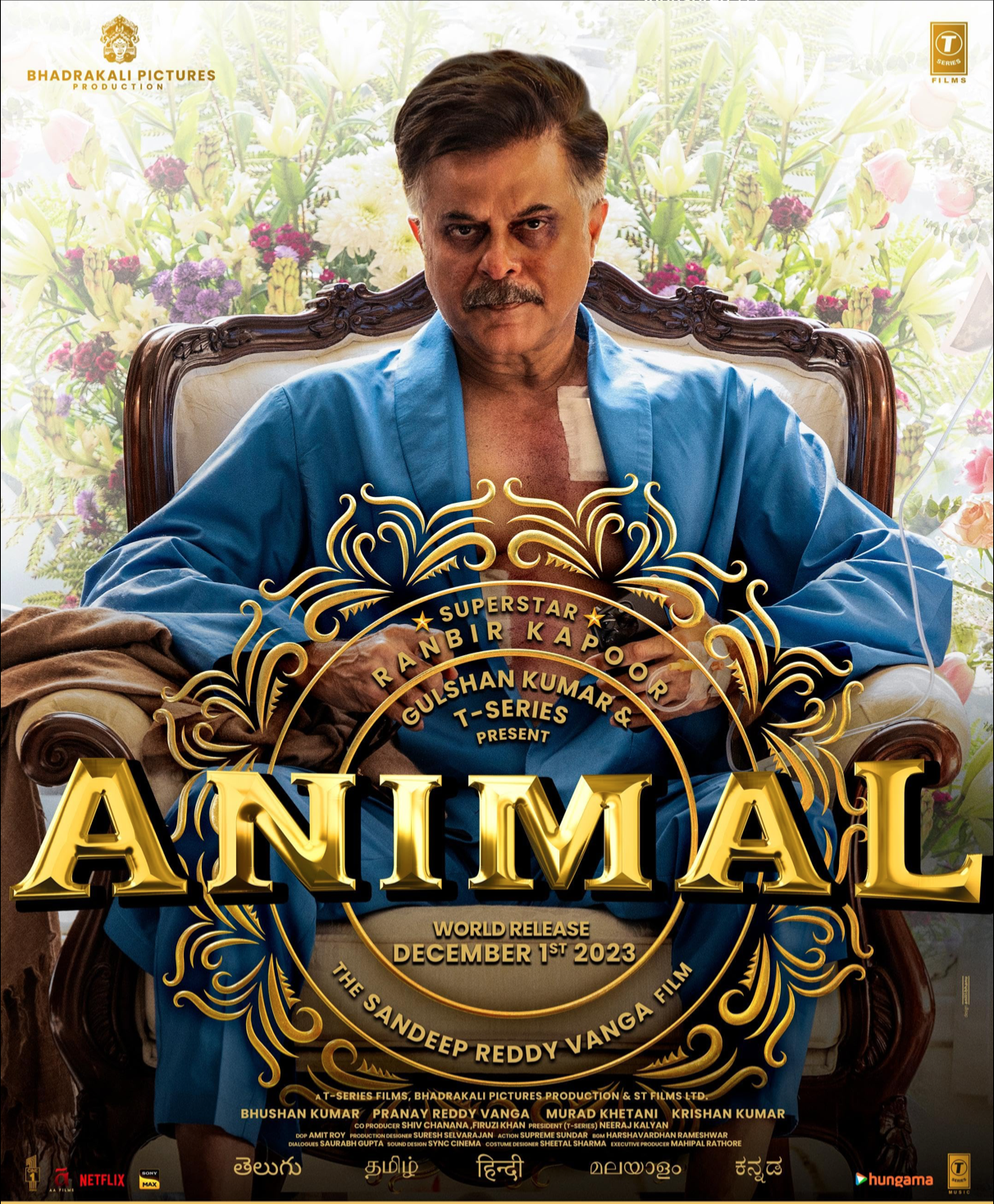Release date: | December 1, 2023 |
Director: | Sandeep Reddy Vanga |
Cast: | Ranbir Kapoor, Rashmika Mandanna, Anil Kapoor, Bobby Deol, Tripti Dimri, Upendra Limaye, Suresh Oberoi, Saloni Batra |
Language: | Hindi with some English, Punjabi, Marathi etc |
I cannot remember the last time the gifted veteran actor’s dialogue delivery was this strained and this unintentionally comical. Can’t blame him alone. That scene is so ridiculous, the phallic symbolism so in-your-face, the attempt at profoundness so laughable, and the sum and substance of the episode so juvenile that I burst out laughing.
Ranvijay is fixated on his nether regions throughout Animal. He keeps drawing attention to the area by either pointing at his crotch or baring it or talking about it or griping about his underwear. In one scene, he speaks of both his “penis” and “anus” – his choice of words, not mine. It is all meant to be very very cool.
Animal is directed by Sandeep Reddy Vanga who debuted with Arjun Reddy (Telugu, 2017), and remade it in Hindi as Kabir Singh (2019). Animal – edited by Vanga and co-written by him with Pranay Reddy Vanga, Suresh Bandaru and Saurabh Gupta – seems bent on enraging those who slammed his earlier works. That goal is evident throughout this boring, blood-spattered film – in Ranvijay’s bizarre remarks and deeds, the all-pervasive violence, misogyny and gore.
So that’s 3 hours and 21 minutes of revenge against those who criticise misogynistic cinema. 201 minutes of a desperate desire to shock and/or offend.
Don’t be deceived into considering it mindless though. Bloodshed and immaturity may rage across Animal, but make no mistake about this: the film is steeped in messaging about victimhood – male victimhood and an allusion to the majority community too.
Vanga’s film is a painfully long account of a boy longing for his father’s love. The said Dad is the industrialist Balbir Singh who has no time for his children. His neglect translates into anti-social behaviour and obnoxious cockiness only in Ranvijay who becomes an obsessive son and entitled lover, while his sisters somehow grow into women who don’t resent or bash up all and sundry.
For the zillionth time, let me pre-empt the clichéd question that always comes from defenders of such cinema: violent men do exist in the real world and a violent man can certainly be the central character in a film – the issue here, as always, is the manner of the portrayal, the script’s indulgence towards him, the humour and coolth written into his fictional character, and the various means used to give him an allure despite his violent ways.
The strategised depiction of Ranvijay and his arch enemy Abrar (Bobby Deol) – arriving late in the second half – illustrates how the difference between a film’s gaze on two equally violent characters is used to steer audience reactions to them. Both commit horrifying acts, both treat women terribly, yet there is never a doubt about who is the hero or with whom the director wants our sympathies to lie. Animal may call itself Animal with reference to Ranvijay, yet his animalism is preceded by scene after scene dwelling on his childhood pain, his protective brotherly conduct, his aversion to sexual harassment, his advocacy of marital fidelity and so on, thus establishing him as a traumatised man with innate goodness. By the time his beastly side is exposed, a point has been firmly made that everything he does that is seemingly wrong is in fact done for the greater good. In contrast, the only Abrar we get to know is the brute who kills, rapes and terrorises.
For good measure, Abrar’s Muslimness is underlined by pointedly mentioning his family’s conversion to Islam.
If Ranvijay rips up human flesh, it is to avenge an attack on his father. If Ranvijay cheats on his wife (mind you, after lecturing other men when they cheat on their wives), he does it for a noble cause. Poor misunderstood Ranvijay had sex only to save his family, you know.
Ranvijay assaults Geetanjali and a defence is woven into the script. He proposes that just as there is a first kiss and a first time having sex in a relationship, so also there should be a first slap. And guess who gets slapped first?
Sigh. Poor misunderstood, suffering, victimised Ranvijay.
Poor Ranvijay who has a solitary wife, and is up against evil, brutal Abrar with three wives.
Now contrast this with the mellow tone of the scene in which Ranvijay converses with Geetanjali while examining the bruises he inflicted on her body.
Note too that the relentless cruelty inflicted by Ranvijay on various people is bookended in this carefully constructed narrative by lengthy scenes emphasising his vulnerable nature.
So, to circle back to that predictable question, “Violent men do exist, so what’s wrong with a film portraying reality?”, I repeat: yes, violent men do exist in the real world, and the issue here, as always, is the director’s gaze on them and their violence.
Animal brims with an intense dislike of women, outspoken women in particular, and evolved, gentle men. It begins with a derisive use of the word “toxic” in a fable narrated by Ranvijay about a monkey that harassed a princess. The contempt is obviously for the term “toxic masculinity”, popular in the feminist lexicon, that was widely applied to Vanga’s first two films.
At one point, Ranvijay mocks Geetanjali for complaining because she has to change pads for four days in a month – he claims she complains, we don’t hear her doing so – while he, he tells her, has not complained though his body has been invaded by doctors during a life-threatening situation. Talk about false and stupid equivalences. Periods are a natural bodily function – often horribly painful, always incredibly inconvenient – that every woman bears for every single month of her entire reproductive life lasting for three to four decades. Ranvijay’s condition, on the other hand, is caused by a human aggressor; it is not the biological fate of all men. Here, Ranvijay is a version of misogynists who troll women for using the social media to raise awareness about cramps, excessive bleeding, agonising period pains and the trivialisation of these experiences by society.
Oddly enough, the determinedly misogynistic Animal writes a feminist element into Ranvijay’s character – he explodes with anger when his brother-in-law roughs up his sister early in the film. There is no progression shown from that scene to his own extreme hostility to his wife.
Animal’s terrible attitude to women runs alongside a cunning use of India’s religious minorities.
Abrar and his cohorts are stereotypes diligently being peddled by Hindi cinema to echo the current Islamophobic national discourse. There is even a Muslim man in the picture who is described as a butcher from Istanbul. His sole contribution to Animal is a stomach-churning slaughter of men.
The Sikhs in Animal are Ranvijay’s brethren and protectors, an extension of a positive stereotype: the fierce, fiercely loyal Sardarji. They are also his allies against Abrar’s marauding gang. All this leads up to a climactic confrontation between shirtless men on an airport tarmac – talk about Hindi film clichés! – in which a kirpan is handed to Ranvijay so that he can wrap up a fight unto death.
Without giving away plot points, I can tell you this much: according to Animal’s underlying philosophy, Sikhs are family and very much in the Hindu fold, Muslims are family that chose the wrong path and are now out to destroy the mother clan, and Christians are the other.
The mind games played by Animal are packaged in slick production design and cinematography, accompanied by a pulsating sound design, infectious music, and Ranbir’s immersive performance.
Despite all this, I was bored stiff by the film.
Startling violence is used here to compensate for a thin, trite storyline. In the first half hour, I was curious about where Vanga would take it, but I spent the remaining 171 minutes stifling yawns at the transparent effort to be disgusting. The camera zooms in on a pulverised human eye. A knife is run back and forth, back and forth, back and forth over a human neck in close-up instead of one swift slash that filmmakers usually favour.
For the record, Animal is not the most violent film ever made in India. Others have done as bad or worse. It is ugly though – in both its use of violence and in its intent.
Ugly. Hate-filled. Tedious. Self-indulgent. And hawking a loathsome agenda.
Misogynists insist that feminists hate men, although all that feminists want is gender equality. You know who hates feminist men? Answer: misogynists. You know who hates men in general? Answer: misogynists. I cannot for the life of me imagine a feminist – female or male – ever conceiving a film that makes men look as foolish, puerile, self-pitying and pathetic as Animal does.
Rating (out of 5 stars): 0
Running time: | 201 minutes |
Poster courtesy: IMDB




You Don't know anything
ReplyDeleteSo says a misogynist. Stay in the jungle boy.
DeleteOMG, thank you for this review. Forget animal, I dropped all intentions of watching it, but if I am to give life to your review, it will become a top notch parody of everything that is wrong with new India and its wannabe (subliminal) cheerleaders.
DeleteThanks for this detailed review. Brilliant and brutal! Hope all our movie reviewers stop endorsing such insane movies.
ReplyDeleteLoved your review! You don't just skim the surface but provide insight into the movie and cinema, the medium and its role.
ReplyDeleteLoved the review! Thanks. In your review you don't just skim the surface but provide an in-depth critical reading of the film! ❤️
ReplyDeleteIf you want to bash a movie at least put correct facts. Feels like you didn’t understand the movie well. The monkey story is being told by Aziz and not Ranvijay
ReplyDeleteIf you have a theory, by all means feel free to publicise it, but please don't call it "fact". I am aware that this theory is floating around on the Net, and I suspect that the goal of floating it has been to build hype around the sequel. Without offering substantiation, you cannot possibly claim as "fact" that the person narrating the fable of the monkey in the opening scene is not Ranvijay - unless of course you are Sandeep Reddy Vanga himself or a member of his team writing from an anonymous account :)
DeleteRanbir Kapoor pointed out that those that get triggered easily may want to stay away from the movie, that applies to you as well Anna. You have a strong sense of right and wrong, good and bad, and have very little tolerance for things that YOU think is not right. You should have stayed away from this movie.
ReplyDeleteThis is not a logical comment to make to a film critic. Analysing films is work for me. That apart, telling a professional critic that her review has come from a place of being "triggered" by a film sounds more than a bit patronising.
DeleteYou clearly have written this not from the point of view of a professional critic but that of a jilted ex who got triggered seeing their ex with someone new.
DeleteThere is absolutely no doubt that the movie is problematic but the way you have written is has no nuance or understanding. It truly is the Animal of the review world but that would be giving you a compliment.
If you truly believe that this is something written by a professional critic, I have a 17th century marble monument in Agra that I'd like to sell to you.
When people resort to personal remarks in a discussion, it immediately becomes clear that they do not have facts or logic on their side. This anonymous commenter is also making a desperate attempt to formulate a metaphor but lacks the skill required to do so. Hence the distasteful personal attack. I could have deleted his comment, but I am choosing to publish it because it serves as an educational example of poor reasoning that I hope will help students who are working on their logic and reasoning abilities.
DeleteIf you want facts or logic on why your review is poorly written, I have a simple answer for you: JUST READ YOUR OWN BLOG.
DeleteThere are countless people (with good reason) who have given poor reviews to the movie but none of them are as poor as yours. For good measure, please read the review on Culture Mix, Film Legacy or even Variety. They have done such a good job of panning the movie without adding their own social commentary or hyperboles.
I am repeating this again. Your review does not look like it's written from the point of view of a film review and lacks any kind of nuance. I know your only comeback here is going to be "look an anonymous troll is commenting on my commentary" because you feel you are too good for any kind of feedback. And that's your opinion and you are free to have it.
I wrote my opinion on your review and you are absolutely entitled to ignore it as a comment from a troll instead of looking at it as genuine feedback on your work.
This anonymous individual's third comment is a further illustration of a tried-and-tested strategy that is often used online and offline, especially in the political arena.
DeleteSTEP 1: make personal remarks about the person being addressed. (In this case, he/they told a critic that she was "triggered" and that she sounds like a "jilted ex".)
STEP 2: on being called out for those personal remarks, play innocent - pretend that you were being professional, objective and polite from the start, and claim you were offering "genuine feedback".
Dictating to a professional film critic what films she should/shouldn't watch and commenting about her love life is not "genuine feedback".
STEP 3: put words in the other person's mouth. E.g. I did not use the word "troll" for this commenter but he/they implies that I did.
I think I have made my point, so I will not respond to further comments from this person. Past experience with such commenters on social media tells me that the next comments will be vicious and abusive anyway, either here, or alternatively, that they will dash off to social media to air those comments since I may not publish them here.
This is a pity. As a journalist, I have had such enriching discussions over the years with viewers and filmmakers, including those who vehemently disagree with me, but those are people who are actually interested in debate. Persons like this anonymous commenter ruin the potential for engagement by starting out with condescension, following it up with aggression, and then playing victim.
Regards,
A very realistic and superb review 💯
ReplyDeleteI can't even say 'I pity you' - because I don't! (pun intended)
ReplyDeleteTeri aukat h to jaake movie bna le tu jitna royegi utna movie kamayegi
ReplyDeleteMalayali reviewer thoo h tri soch pe
ReplyDeleteWonderful review Anna. Thanks for articulating this embarrassment of a movie so well. this movie will age badly!
ReplyDeleteBjp will rule India again and again....you can cry with those anti nationals
ReplyDeleteThank You so much for writing such sane review for this insane, vile , propaganda movie. This movie has no flow, rhythm or content. Its just pure compilation of sexual, dirty and hateful fantasies of right wing person of India. This movie is harmful for India's society which is already on downhill. These establishes celebrities could have easily said NO for this movie. This movie will haunt them in future. And this movie should't be compared with Quentin Tarantino movie or Korean movies. This movie not just bad content, its worse on direction, dialogue, editing and other movie making aspects. Intital theme music copied from Kill Bill, Fight scene in lobby copied from OldBoy. This is just pure shameless and abusive act on moviemaking itself.
ReplyDeleteIs this majority community so bad anna
ReplyDeleteI was surprised because you review a film right , but you reviewed how bad majority community is and how poor minor communities are. Technically all religion are man made so all are riding same boat and has same agenda . How can be one bad and others good .
DeleteI'm grateful for the laugh this anonymous commenter has given me. Wonder which film they watched and whose review they read?
DeleteA relief to hear a voice calling a spade a spade. Thanks Anna.☘️
ReplyDeleteUseless biased review , let me also guess Anna you are from Kerela right?Although I have to agree that I disliked the movie, there is no substance to the story neither any redeeming factors but this whole vitriole of targeting minority etc I dint see one bit. It's how your bigoted and Hindu hating eyes see Anna, not the truth. So stop pushing your agenda via reviews where there is no issue
ReplyDeleteWhat an intelligently expressed review. Insightful and eloquent.
ReplyDelete